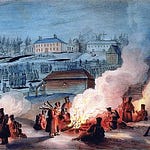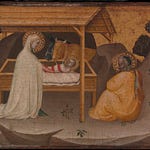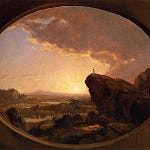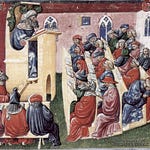When Odysseus, that far-traveled fellow, landed on the island of the Cyclops, he took a view of it that a farmer or a herdsman would take. He liked the rich well-watered fields, the flat stretches of good land for plowing, and the wild grapes hanging from the trees. I think that was Homer reminiscing about his own home, wherever that may have been — everybody in ancient Greece wanted to say, “Homer was born here!” but we don’t really know. It wouldn’t have occurred to him to praise a land for having a mountain, our Word of the Week, looming over everybody’s back yard. A mountain is going to be rocky, and even if it’s one of our ancient tree-covered grassy soft-topped Appalachian mountains, it’s not the easiest thing in the world to get a farm from. And people do need to eat, right?
Still, mountains do fascinate us. Imagine the water of Angel Falls, plunging over the brink of a mountain cliff in Venezuela, more than 3,000 feet in its total fall, and more than 2,600 feet — half a mile! — in one uninterrupted leap. You look up and you say — I don’t know what you say. I’ve never been there. Probably you’d best say nothing at all. Those same ancient Greeks who heard men sing the poetry of Homer had mountains all around them, which was why you could end up with so many city-states developing their own customs and forms of government; mountains get in the way of generals who might want to take over the whole deal. But they don’t seem to have climbed those mountains for the fun of it. That’s why they imagined the gods dwelling on “the snowy top of cold Olympus,” as Milton put it, though I think that Olympus in the Greek mind was airy and filled with light.
Who was the first fellow who climbed a mountain just to see what he could see from it? Of course we have no idea. But we have a good guess as to who was the first to write about it. That was the poet Petrarch, who climbed Mont Ventoux, in Provence, along with his brother and some local guides, in 1336. Of course he turned it into a sort of moral allegory. His brother, he says, took the difficult but straighter way, more directly to the top, while he got himself all caught up in trying out easy ways, but he ended up exhausted and not getting any closer. Mont Ventoux, “Windy Mountain,” is more than 6,000 feet high, and it’s a lot higher than any nearby mountaintops, so that it’s prone to very high winds, sometimes more than 200 miles per hour. Anyway, if you get to the top of Mont Ventoux on a clear day, you can see long vistas all around you; the Mediterranean Sea to the south, part of the Alps (and Mont Blanc) to the east, and the Rhone Valley in between, and even the Pyrenees far to the southwest. Sublime, I’d say.
Sometimes, though, it was good to live on the top of a mountain. That’s where my mother’s people come from — the top of a mountain in southern Italy, where you find the village of Tiriolo. I think the name means “Little Tyre,” suggesting that people have lived there since the Phoenicians, those restless seafarers, settled 2,400 years ago. Now that’s old! There were two benefits you got from living up high in such a place. The first was that you were hard to conquer. Anybody who wanted to invade would have to make themselves visible from a long way off; too much trouble for too little gain. The other was that you were more likely to get cooler breezes up there and a little more rain, so that you’d learn to farm the mountainsides by carving terraces into them and letting rainwater flow in channels to water the crops. That’s what my cousins in Tiriolo still do.
Then of course there are mountains in Scripture, plenty of them. When I was a kid, I occasionally would hear somebody josh somebody else, somebody daydreaming perhaps, by saying, “Come down off that mountain, Moses!” Elijah went up to Mount Horeb, to be alone, to pray, even to get away from Jezebel and Ahab, who sought his life. Jesus went often into the mountains. What would he see and hear? Maybe it’s what he wouldn’t have to see and hear, at least for a while: people haggling with merchants over some skins of wine; soldiers on the march, chanting soldier-songs, not always the cleanest things in the world; mothers getting cross with their children who won’t mind them; one rabbi arguing with another; such things. Maybe on the mountain you can hear things that can’t be put into words. I don’t know. I’m not a mountain climber, but many a time when I was a boy I went to the top of a high hill from which I could look down at the whole town far below, and I liked my town better from up there, with its crazy streets that straggled up the other side of the valley and then petered out, than I ever did when I was down below. More than fifty years have passed, and I can still see it in my mind’s eye, and I love it.
Our word mountain comes to us from the Norman French, who got their word muntaine from late Latin montania, mountains as a collective; that came ultimately from Latin mons, mountain. The odd thing is that Old English already had the word munt, mount, which they too got from Latin, borrowing it. That’s because, you may know, the Romans did rule Britain as a province before the Angles and the Saxons drove the natives, who by then were Christian — Celtic people — into the mountains of Wales. So we have the nouns mount and mountain, and they seem to mean the same thing, more or less, but we don’t use them the same way. In English, if you put the mountain’s name second, it follows the word mount: Mount Washington, Mount McKinley, Mount Everest. If you put the mountain’s name first, the word mountain will follow: Elk Mountain, Lookout Mountain. The word mount can be used figuratively for any single physical prominence or for some emotional height: someone may have scaled the mount of ambition. But if you use mountain figuratively, you’re really thinking of a big physical heap, something shaped like a mountain: a mountain of debt, or a mountain of goodies, like — rock candy, maybe?
Word & Song by Anthony Esolen is an online magazine devoted to reclaiming the good, the beautiful, and the true. We publish six essays each week, on words, classic hymns, poems, films, and popular songs, as well a weekly podcast for paid subscribers, alternately Poetry Aloud or Anthony Esolen Speaks. Paid subscribers also receive audio-enhanced posts and on-demand access to our full archive, and may add their comments to our posts and discussions. To support this project, please join us as a free or paid subscriber. We value all of our subscribers, and we thank you for reading Word and Song!













